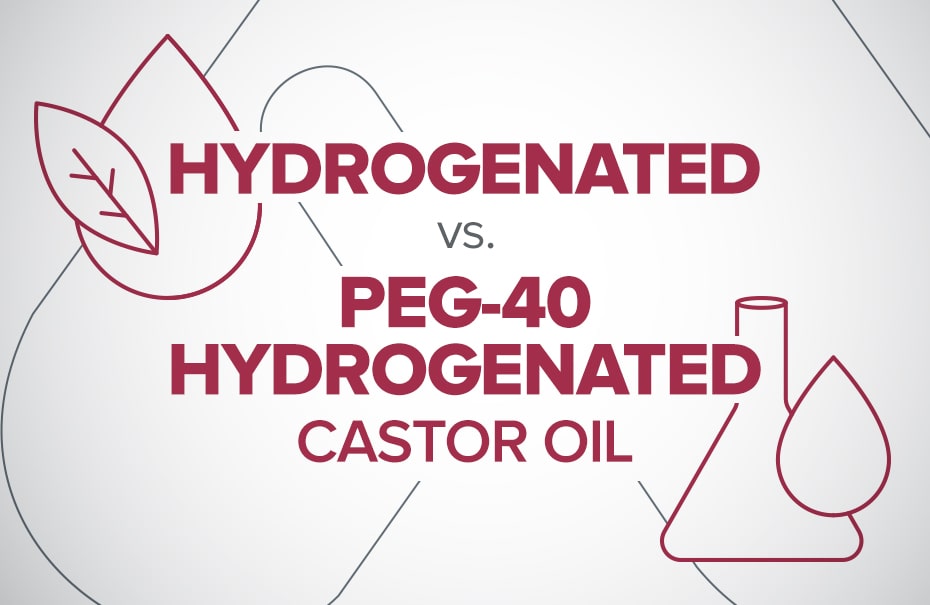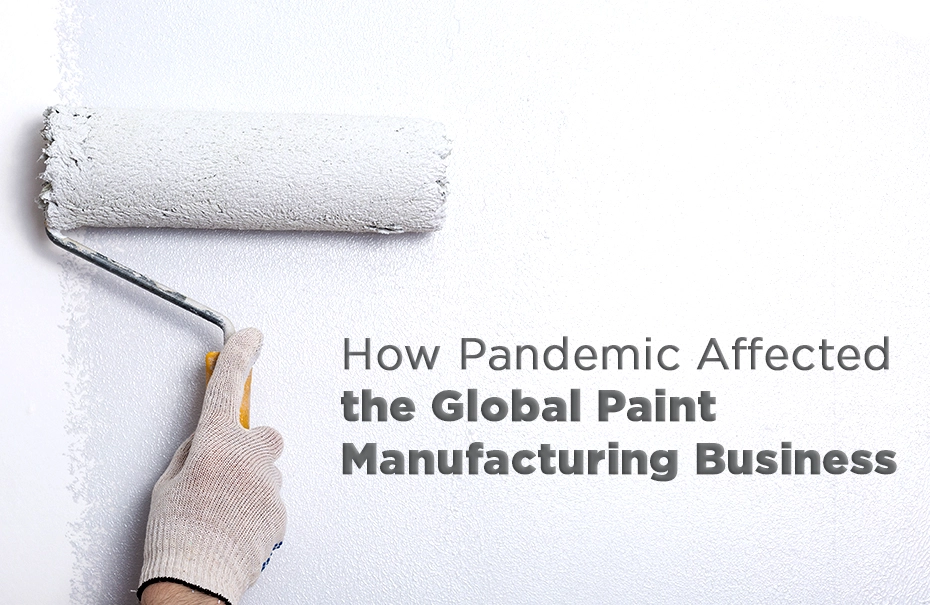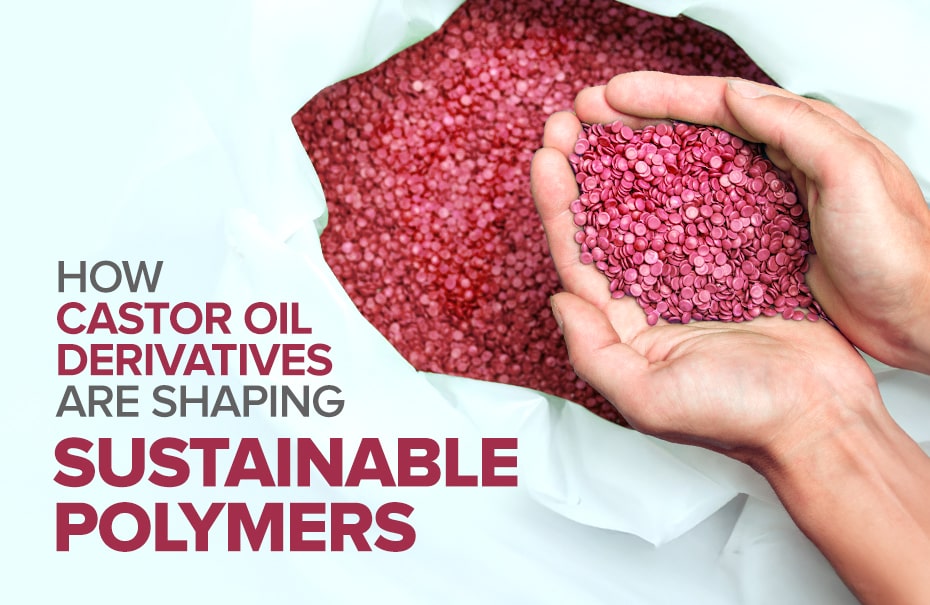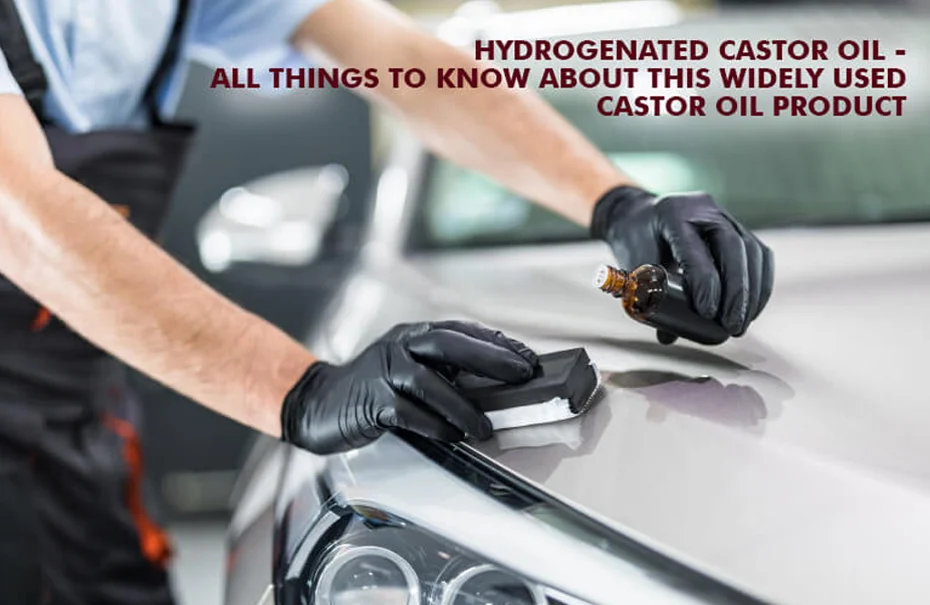Hydrogenated Castor Oil vs. PEG-40 Hydrogenated Castor Oil

Among formulators, there has always been a debate over the selection of castor oil derivatives, be it hydrogenated or PEG-40 hydrogenated castor oil. They are both popular and have distinct advantages, although the selection of one of them lies in the performance, compatibility, and compliance with the requirements of the regulatory environment.
Hydrogenated castor oil is more versatile and resistant to change, whereas PEG-40 hydrogenated castor oil is water-soluble and highly multifunctional. The distinction between them does not end with the technical characteristics; it is based on the product quality, user satisfaction, and compliance standards. The partnership with trusted Hydrogenated Castor Manufacturers like Ambuja Solvex guarantees you the most optimal balance in your needs.
Let’s compare Hydrogenated Castor Oil vs. PEG-40 Hydrogenated Castor Oil in detail.
What Are They?
Hydrogenated Castor Oil
Hydrogenated Castor Oil (also known as castor wax or HCO) is a product of castor oil that has undergone hydrogenation of the unsaturated bonds of the castor oil with the help of a catalyst. The product is a solid, wax-like substance with high melting points that is hard in nature and can easily be mixed with most lipid systems.
Key Properties:
- Solid at room temperature (white, waxy, opaque flakes or chips).
- High melting point (around 86° C).
- Whether insoluble with water, soluble, or dispersible in most oils or solvents.
- Wax-like texture provider, emollient, structurant.
Due to these characteristics, hydrogenated castor oil will be used when a solid texture, increased level of hardness, a wax base, or structural strength is needed in cream-based products, sticks, balms, and wax blends. To satisfy such structural and stabilizing requirements, reliable suppliers of hydrogenated castor, such as Ambuja Solvex manufacture hydrogenated castor oil in accurate and quality-checked grades.
PEG-40 Hydrogenated Castor Oil
PEG-40 Hydrogenated Castor Oil is Hydrogenated Castor oil that is modified. It is manufactured by mixing hydrogenated castor oil with polyethylene glycol (PEG), which provides it with water solubility, and emulsifying and surfactant properties.
Key Properties:
- Amphiphilic: it is able to react with the oil and water phases.
- Solubilizer, emulsifier, surfactant – it lowers the surface tension and is used to mix immiscible phases.
- Transparent to semi-clear in formulations (aids in explaining emulsions).
- Typical levels of use are 1-10% (depending on formula).
PEG-40 Hydrogenated Castor Oil is a product that is used in numerous products such as emulsions, gels, lotions, shampoos and other water-based formulas. The reason is that it is capable of dissolving oils, it contains fragrances and helps evenly distribute essential oils.
Comparison: Hydrogenated Castor Oil vs. PEG-40 Hydrogenated Castor Oil
The following is a comparative snapshot in order to assist formulators:
| Feature / Parameter | Hydrogenated Castor Oil (HCO) | PEG-40 Hydrogenated Castor Oil |
|---|---|---|
| Physical State | Solid, waxy, opaque | Soft solid / paste / semi-solid, dissolves in oil and water. |
| Water Solubility | Insoluble in water | Amphiphile, water-dispersible or solubilizing. |
| Role | Structurant, wax, stiffener, emollient, texture agent | Emulsifier, solubilizer, surfactant, clarifier |
| Common Applications | Sticks, balms, wax blends, solid emulsions | Lotions, creams, shampoos, gels, fragrance solubilization |
| Ability to Mix with Water Phase | Should be in the oil phase; can’t emulsify with water by itself | Bridges between oil and water phases and decreases interfacial tension |
| Benefits | Good emulsification, waxy, non-ionic, stable | High structural integrity, improves clarity and transparency, highly versatile |
| Challenges or Limitations | Not flexible in water formulas; incapable of dissolving fragrance or oils in the water phase | May contain trace impurities (from PEG processing); not purely natural |
| Safety and Regulatory | Well-known, stable, widely used in cosmetics | Regulated and safe within scope of use; ethoxylated ingredients may require assessment |
Thus, an insight gained from industry discussions is that they are not interchangeable. The hydrogenated castor oil is not an emulsifier; it is a waxy structural ingredient. PEG-40 hydrogenated castor oil is an emulsifier/solubilizer that is water-soluble and derived from the wax.
When To Use?
Hydrogenated Castor Oil
- Stick and Solid Formats: Lipsticks, balms, solid perfumes, waxy sticks. In this case, the structural integrity (melting point) is of concern, and HCO can be used to give a firm and skin-friendly texture.
- Stabilizing Emulsions: It is a structurant or backbone wax in the emulsions that helps stabilize viscosity and prevents melting or separation during heat stress (and emulsions especially in tropical climates).
- Occlusion/ Moisture Retention: It creates a light shielding layer, which contributes to minimizing the rate at which skin loses water, particularly with thicker formulations.
- Compatible: It is quite compatible with oil as well as water. Because of this, it can be mixed well with waxy substances, oils, and esters.
PEG-40 Hydrogenated Castor Oil
- For Emulsions and Solubilization: PEG-40 HCO is used to combine products soluble with oil, such as fragrances, UV filters, and colorants, with water-soluble products.
- To Boost Foam/Surfactant: It may be a co-surfactant in cleansing systems that helps boost foam and mildness.
- Ease of Formulation: It is easy to prepare; it is often added to the oil phase and mixed with water. It assists in cutting down on the use of several emulsifiers.
- Moderate Emulsifier: It is not a heavy ionic emulsifier, but can stabilize lower-shear emulsions, moderate emulsions, or can be used in synergistic mixtures with other emulsifiers.
PEG-40 HCO, however, cannot be used completely to substitute stronger emulsifiers (e.g., ionic surfactants or polymeric emulsifiers) in challenging systems. It is a workhorse and not a miracle worker.
Conclusion
Hydrogenated Castor Oil (HCO) and PEG-40 Hydrogenated Castor Oil may have a common origin with castor oil; however, the two differ radically in functionality, performance, and use. One is a waxy structural ingredient, and the other is an aqueous-functional emulsifier/solubilizer. Knowledgeable formulators know where each works best and can even be employed together.
At Ambuja Solvex, we are not merely hydrogenated castor oil manufacturers, but your development partner. Our castor derivatives are there to support you in your innovation, whether you are making a cream, shampoo, or balm, or a specialty chemical blend.
|
FAQs
- What is the primary difference between Hydrogenated Castor Oil and PEG-40 Hydrogenated Castor Oil?
Hydrogenated Castor Oil is a solid, waxy structure and stability ingredient, and PEG-40 Hydrogenated Castor Oil is a water-soluble emulsifier and solubilizer.
- Is it possible to use Hydrogenated Castor Oil in formulations (especially cosmetic products) based on water?
No, Hydrogenated Castor Oil is not water-soluble; it should be applied in oil-based formulas such as balms, sticks, and wax combinations.
- So why would we select Ambuja Solvex as a Hydrogenated Castor Manufacturer?
Ambuja Solvex guarantees the highest quality, reliability, and scalability of supply of castor derivatives supported by profound expertise and strong global distribution.



